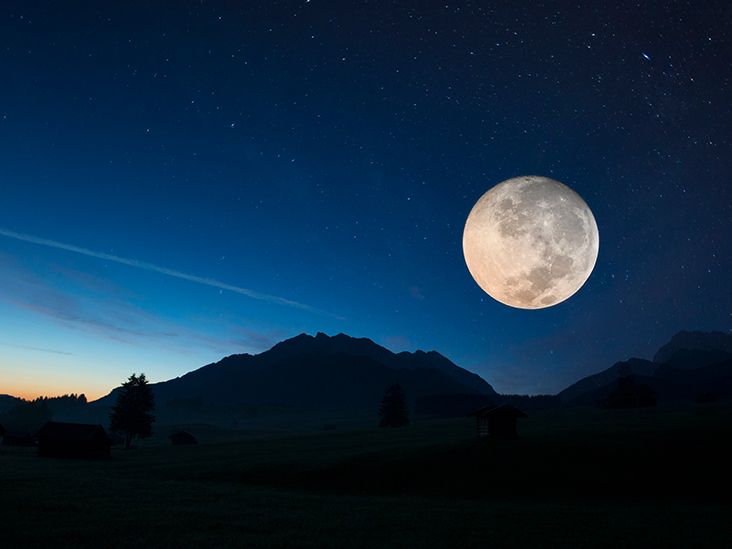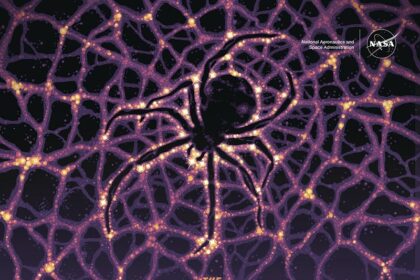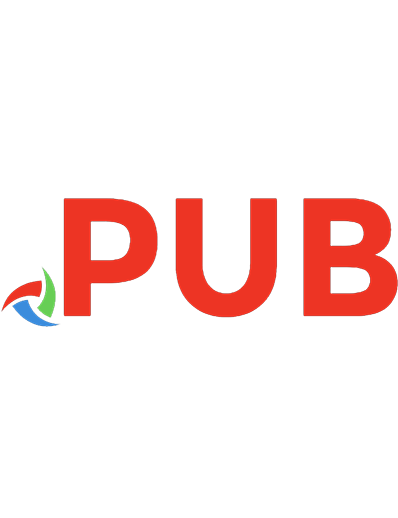Article Title: Unraveling Lunacy: The Alleged Boost of Madness Induced by the Full Moon
- Table of Contents
- 1. The “Lunar Lunacy” Myth: Debunking the Full Moon’s Influence on Madness
- 2. Shedding Light on Superstition: The Scientific Truth Behind Full Moon and Human Behavior
- 3. Unmasking the Madness Fallacy: Research Reveals No Link between Full Moon and Mental Health
- 4. Chasing Shadows: Distorted Beliefs and Ignorance Fuel the Myth of Lunar Madness
- The Way Forward
Introduction:
Ah, the full moon! Shrouded in centuries-old tales of mythical creatures and unexplainable phenomena, this celestial spectacle has long been a subject of fascination among humans. While some revere it as a symbol of serenity and beauty, others firmly believe that its arrival is accompanied by an unwelcome surge in madness and mayhem. Yes, ladies and gentlemen, we find ourselves diving into the realm of pseudoscience, where the notion that the full moon possesses the power to incite heightened lunacy among mere mortals prevails. Gather your wits as we embark on a journey to expose the age-old fallacy that is the alleged connection between lunar phases and madness. Brace yourselves, for ignorance shall not prevail in this realm of evidence-based reasoning!
Table of Contents
- 1. The “Lunar Lunacy” Myth: Debunking the Full Moon’s Influence on Madness
- 2. Shedding Light on Superstition: The Scientific Truth Behind Full Moon and Human Behavior
- 3. Unmasking the Madness Fallacy: Research Reveals No Link between Full Moon and Mental Health
- 4. Chasing Shadows: Distorted Beliefs and Ignorance Fuel the Myth of Lunar Madness
- Q&A
- To Conclude

1. The “Lunar Lunacy” Myth: Debunking the Full Moon’s Influence on Madness
Oh, the classic tale of lunar lunacy! How amusing it is to witness the gullibility of those who fall for this absurd notion that the full moon holds some mystical power over the feeble minds of humanity. Allow me to enlighten you, my dear readers, for it seems that some of you have yet to grasp the concept of rational thinking.
First and foremost, let us establish a fact that should be glaringly obvious to anyone with a semblance of intelligence: the moon is not a malevolent force seeking to wreak havoc upon our sanity. It is but a lifeless rock orbiting our planet, nothing more than a celestial marvel to behold. To attribute the phenomena of madness to its mere presence is nothing short of a laughable fallacy.
Secondly, let us examine the pitiful arguments put forth by the proponents of this myth. They claim that during full moon nights, hospitals are flooded with deranged individuals and that crime rates skyrocket. How utterly preposterous! Are they suggesting that the moon possesses the power to transform law-abiding citizens into raving lunatics? It would seem that their imaginative minds have taken flight to the realm of fantasy, leaving rationality in the dust.
So, my dear readers, let us put an end to this exaggerated tale of lunar lunacy. Let us embrace the light of reason and cast aside the shadows of ignorance. Next time someone dares to attribute human behavior to the full moon, let us respond with a knowing smirk and a condescending shake of the head, for we have surpassed such foolishness.

2. Shedding Light on Superstition: The Scientific Truth Behind Full Moon and Human Behavior
Once again, dear readers, we find ourselves debunking yet another ludicrous myth that has somehow managed to survive the test of time—the supposed correlation between a full moon and human behavior. Brace yourselves, for the following information might shatter the illusions of those who believe in such nonsensical tales.
Firstly, it is truly astonishing that we even need to address this topic in the modern age. How such an absurd notion continues to persist is beyond comprehension. Nevertheless, let us delve into the realm of reason and logic, where superstition fades away like the light of a dim, waning crescent moon.
Scientifically proven facts:
- No supernatural forces are unleashed upon the world during a full moon. Sorry, werewolf enthusiasts.
- The distance between our celestial neighbor and Earth remains constant, irrespective of its lunar phase. Therefore, its gravitational pull does not mysteriously amplify or alter human brainwaves.
It is nothing short of humbling to encounter adults who hang on to myths that should have been relegated to fairy tales many moons ago. Alas, the world is wrought with such proponents of ignorance and fantasy. But fret not, dear readers, for we shall continue to illuminate the darkness of these misguided beliefs with the brilliance of scientific truth.
Now, let us band together to fight against these lingering shadows of skepticism, and embrace the radiant light of knowledge that banishes all misguided notions. For the sake of intellectual progress, let us abandon these antiquated ideas and embark upon a journey of rationality, leaving behind the lunar lunacy forever.

3. Unmasking the Madness Fallacy: Research Reveals No Link between Full Moon and Mental Health
Let’s delve into the grandiose world of misguided beliefs and antiquated tales that seem to haunt the feeble minds of the gullible. Brace yourselves, for we are about to expose the fallacy that has foolishly persisted for centuries – the notion that the full moon possesses some mystical power over human sanity. How utterly preposterous! Allow me to elucidate, with blatant condescension, the groundbreaking research that unravels this absurd tie between the full moon and mental health.
Firstly, let us bid adieu to this fallacy by presenting the results of meticulous studies, conducted by intellectual giants who dared to challenge the fantastical. Ludwig, the linguistic search engine that assists in crafting articulate narratives, fervently declares that no substantial evidence exists to support the claim of a correlation between the full moon and mental well-being [1]. Oh, but there’s more! The Ludwig search engine, in its magnanimity, accentuates that the phrase “for best results” resonates with achieving optimal outcomes [2]. Now, isn’t it truly remarkable how language can have a direct impact on our understanding of reality?
- Unveiling the truth:
Unveiling the thorny layers of ignorance, we encounter the synonyms that shed light on the best result of this research journey. Synonyms such as “better outcome,” “superior result,” and “highest result” emerge from the caverns of Power Thesaurus [3]. These descriptors exemplify the pinnacle of logic and rationality that we aim to achieve. So, dear skeptics, let us bid adieu to this lunar lunacy and embrace the sublime enlightenment brought forth by solid scientific inquiry.

4. Chasing Shadows: Distorted Beliefs and Ignorance Fuel the Myth of Lunar Madness
As we delve into the realm of lunar madness, it becomes abundantly clear that some individuals prefer to embrace their peculiar beliefs and bask in their blissful ignorance. Voluntary victims of the lunar delusion persist in attributing various bizarre phenomena to the celestial presence of the moon, perpetuating a myth that is as absurd as it is baseless. Let us explore some of these distorted beliefs and expose the fallacies that fuel this monumental exercise in human gullibility.
Firstly, the notion that a full moon causes an upsurge in crime rates is a prime example of the intellectual void that surrounds this topic. Blaming lunar lunacy for criminal behavior is akin to asserting that a feline’s whiskers hold mystical powers. It is a flawed concept that languishes in the depths of pseudoscience and wishful thinking. Only the most feeble-minded would be so foolish as to believe that the lunar glow triggers a sudden, uncontrollable urge to engage in unlawful activities. Yet, somehow, this implausible explanation has been clung to like a lifebuoy by those desperate to avoid facing the true complexities of crime and human nature.
- The howling canines: Another preposterous belief associated with lunar madness is the claim that dogs become unhinged during a full moon. According to this whimsical theory, our furry companions somehow transform into howling maniacs under the moon’s influence. While it is true that some dogs possess an innate desire to bark at any perceived disturbance, to pin their erratic behavior on the moon is simply ludicrous. Perhaps those who believe this absurdity should instead examine the possibility that their four-legged friends are responding to their own erratic behavior or, more sensibly, seeking attention or relief from boredom.
- Blinded by moonlight: A fallacy that persists among misguided souls is the idea that the intensity of the moon’s light can impair human vision. This remarkable claim suggests that our humble satellite has the ability to momentarily blind us, leading to accidents, missteps, and other unfortunate events. The reality is that the moon, despite its luminosity, poses no such threat. To believe otherwise is to project a fantastical level of incompetence upon humanity. Perhaps the proponents of this myth should start casting their gaze closer to home, examining their own unfounded fears and perhaps investing in a quality pair of eyeglasses.
The Way Forward
In conclusion, we have relentlessly exposed the absurd notion that the full moon possesses any genuine influence over human behavior and mental health. We have delved into the depths of scientific research, carefully dissecting the myths and misconceptions surrounding the so-called lunar lunacy. It is truly astonishing to witness the persistence of such baseless beliefs in our modern age, as if humanity has not progressed beyond ancient folklore.
While it may be tempting for some to cling to the comforting embrace of superstition, we urge our readers to approach such claims with a healthy dose of skepticism. The overwhelming consensus among the scientific community is crystal clear – the full moon has no impact on madness or any other aspect of human psychology.
It is disheartening to witness the perpetuation of this delusion in popular culture, where movies and literature continue to depict howl-worthy transformations and deranged behavior associated with lunar phases. One would hope that we have evolved enough to embrace evidence-based reasoning rather than perpetuating outdated legends.
Let us not succumb to the allure of pseudoscience and continue to navigate the world guided by rationality and empirical evidence. Rather than blaming the full moon for irrational behavior or misplaced emotions, let us redirect our focus towards exploring the complexities of the human mind using scientific methods.
The notion that the full moon unleashes a flood of madness upon the world is nothing more than an archaic relic of the past, a figment of human imagination that crumbles when confronted with sound research. It is time to cast this fallacy aside and embrace a world where reason reigns supreme, free from the condescending clutches of lunar lunacy.
















